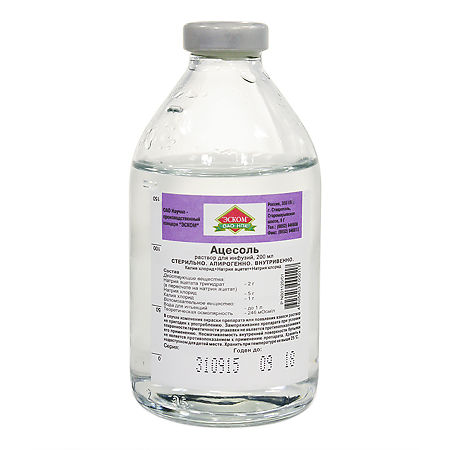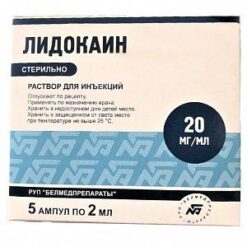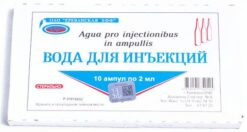No products in the cart.
Acesol, 200 ml
€1.00
Out of stock
(E-mail when Stock is available)
EAN: 4605453000117
SKU: 234526
Categories: Anesthesia and resuscitation, Anesthesia solutions, Medicine
Description
Pharmgroup:
Rehydrating agent.
Pharmaceutical action:
Acesol is a combined drug, has detoxifying, plasma exchange, rehydration, diuretic, antishock, antiaggregant action.
It reduces hypovolemia, prevents blood clotting and development of metabolic acidosis, increases diuresis and improves microcirculation.
Indications
Indications
dehydration;
intoxication (acute shigellosis, food poisoning, cholera).
Pharmacological effect
Pharmacological effect
Pharmaceutical group:
rehydrating agent.
Pharmaceutical action:
Acesol is a combined drug that has a detoxifying, plasma-substituting, rehydrating, diuretic, antishock, and antiplatelet effect.
Reduces hypovolemia, prevents blood thickening and the development of metabolic acidosis, increases diuresis, improves microcirculation.
Special instructions
Special instructions
Treatment is carried out under the control of hematocrit and blood electrolyte concentrations.
If hyperkalemia develops, the drug is replaced with Disol solution until the electrolyte balance is normalized.
Freezing the drug is not a contraindication to its use.
Non-wetting of the inner surface of a bottle or polymer container is not a contraindication to the use of the drug.
Impact on the ability to drive vehicles and operate machinery
No studies have been conducted to assess the effect of the drug on the ability to drive vehicles and engage in other potentially hazardous activities that require increased concentration and speed of psychomotor reactions. In general, for dehydration, the introduction of special solutions orally is indicated, and only if such administration is impossible (uncontrollable vomiting, severe degree of dehydration, severity of the general condition, etc.), the drug is administered parenterally.
Active ingredient
Active ingredient
Potassium chloride, Sodium acetate, Sodium chloride
Composition
Composition
1 l:
– sodium acetate 2 g
– sodium chloride 5 g
– potassium chloride 1 g
Contraindications
Contraindications
hyperkalemia;
alkalosis;
chronic renal failure;
the presence of contraindications to the introduction of large quantities of liquid into the body;
increased sensitivity.
Use with caution in patients with impaired renal excretory function.
Use for renal impairment
Use with caution in patients with impaired renal excretory function.
Contraindicated in chronic renal failure.
Side Effects
Side Effects
swelling
tachycardia
chills
hyperkalemia
Interaction
Interaction
If necessary, a combination with infusion of blood, plasma, polyglucin, etc. is possible.
Overdose
Overdose
Symptoms: Patients with chronic kidney disease or any disease that impairs the excretion of potassium from the body, or if the drug is administered too quickly intravenously, may develop hyperkalemia, which can potentially be fatal. Early clinical manifestations of hyperkalemia (sharpening of the P wave, disappearance of the U wave, lowering of the ST segment, and prolongation of the QT interval) usually appear at serum potassium concentrations of 7 to 8 mEq/L. More severe symptoms (including muscle paralysis and cardiac arrest) develop at potassium concentrations of 9-10 mEq/L. It should be borne in mind that hyperkalemia, which can be fatal, can develop quickly and be asymptomatic.
Treatment: discontinuation of the drug; in case of hyperkalemia, the drug is replaced with Disol solution until the electrolyte balance is normalized. If necessary, hemodialysis and peritoneal dialysis are performed.
Storage conditions
Storage conditions
Store the drug at a temperature not exceeding 25°C.
Keep out of reach of children
Shelf life
Shelf life
Shelf life – 2 years.
Do not use after expiration date.
Manufacturer
Manufacturer
Eskom NPK, Russia
Additional information
| Shelf life | Shelf life – 2 years. Do not use after the expiration date. |
|---|---|
| Conditions of storage | Store the drug at the temperature not more than 25°C. Keep out of reach of children |
| Manufacturer | Eskom NPK, Russia |
| Medication form | solution for infusion |
| Brand | Eskom NPK |
Related products
Buy Acesol, 200 ml with delivery to USA, UK, Europe and over 120 other countries.



